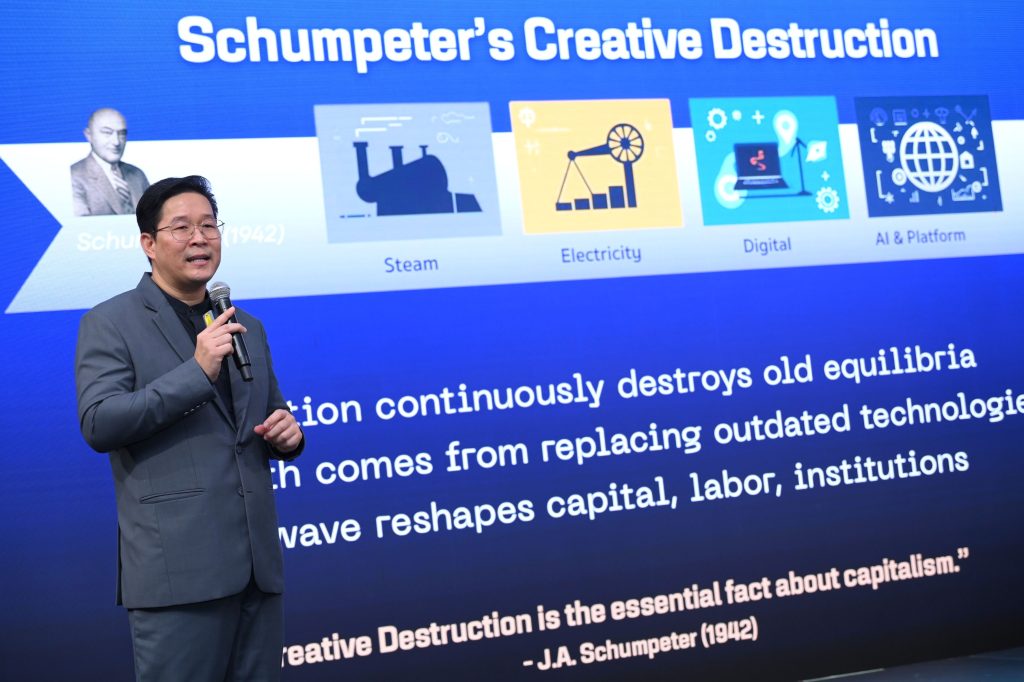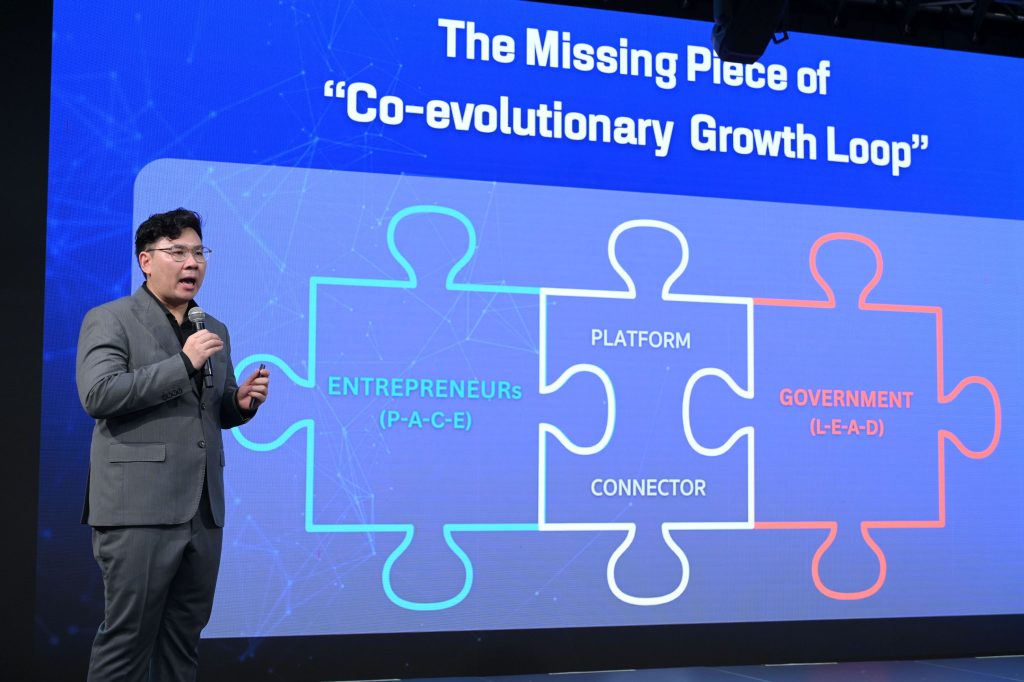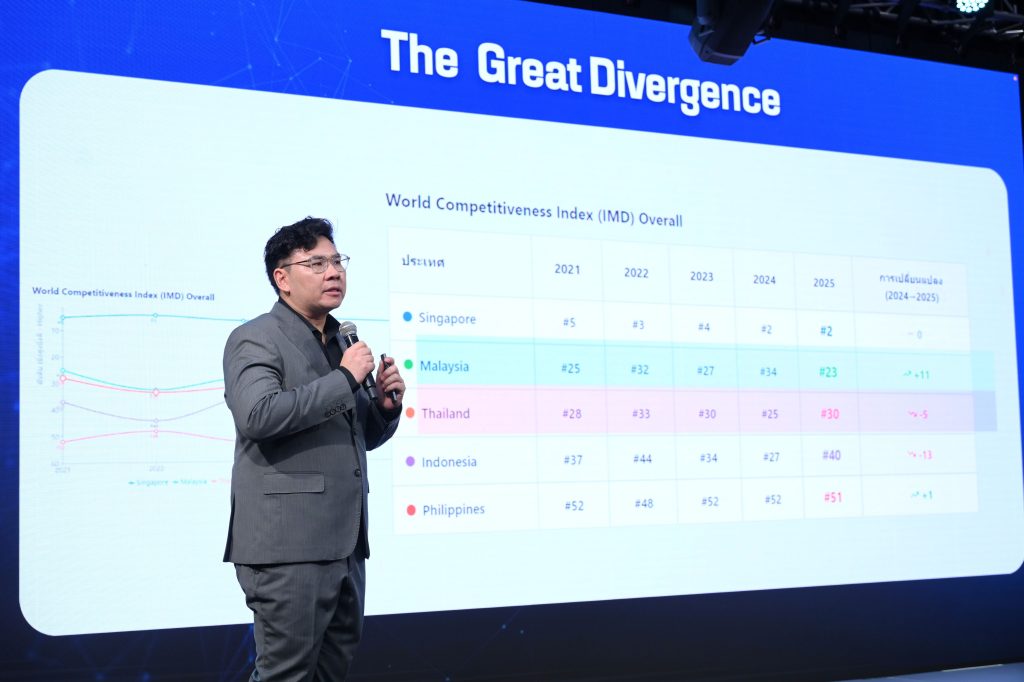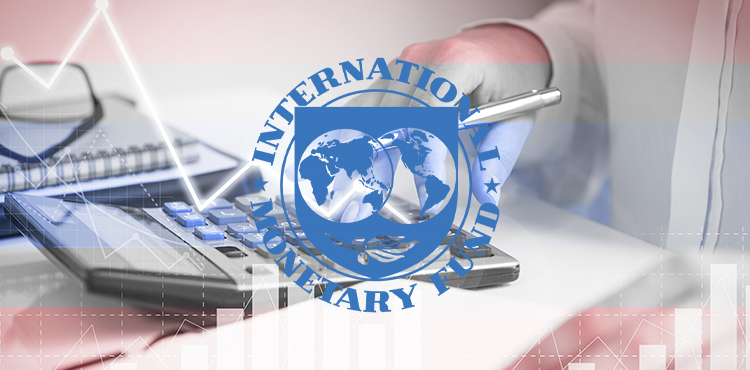The Competitiveness Center, the University of the Thai Chamber of Commerce, has released an in-depth analysis of digital platform dynamics in Thailand through its white paper titled “Thailand’s Platform Economy in the Age of Creative Destruction: Pathways toward Sustainable Entrepreneurship and a Resilient Digital Ecosystem.”
The report connects current circumstances with two theoretical frameworks honored by the 2025 Nobel Prize in Economic Sciences, which identify key factors for sustainable growth through technological advancement. The University of the Thai Chamber of Commerce’s distinguished professors from the Competitiveness Center and the Faculty of Creative Entrepreneurship jointly provided insights through a panel discussion.
On October 13, 2025, the Royal Swedish Academy of Sciences announced the Nobel Prize in Economic Sciences to Philippe Aghion from Collège de France and Peter Howitt from Brown University, who developed mathematical models explaining the process of “Creative Destruction”. When new technologies and business structures replace old models, companies clinging to outdated technologies and business models cannot compete. Innovation thus simultaneously creates new possibilities while destroying existing structures.
Dr. Kittipong Sakornsathien, Director of the Competitiveness Center, University of the Thai Chamber of Commerce, stated: “Digital platforms represent technological advancement that fundamentally challenges traditional supply chains and completely transforms market access strategies. This is achieved through three dimensions that platforms continuously develop: 1.) Management systems which enhance goods distribution processes and transaction processing, 2.) Data systems that create competitive advantages for sellers through personalized product displays that ordinary stores cannot replicate independently, including sharing backend store data with sellers themselves, and 3.) Becoming a fundamental sales channel for entrepreneurs due to advantages including comprehensive data accumulated from long-term service provision and the advent of artificial intelligence (AI).”
Dr. Theerakorn Udomratanamanee, Vice Dean for Administrative Affairs of the Creative Entrepreneurship School, University of the Thai Chamber of Commerce, noted: “Currently, there is accumulating discussion about increases in fees or gross profit fees on various platforms such as e-commerce, ride-hailing services, and food delivery services. Many observers are questioning the underlying drivers of this phenomenon. Consequently, some hope the government will step in to provide support, while others choose to adopt different sales channels. Operationally, these actions reflect necessary adjustments to revenue generation as businesses undertake to navigate changing environments. They are fundamentally aimed at ensuring long-term viability and driving investment in service development. When viewing this through the lens of Nobel Prize-winning theory, we find it is a natural transition process called creative destruction, which we should have been anticipated from the beginning. These platforms have passed the ‘market creation phase’ that focused on massive investment to attract users and are entering the ‘value creation phase’ that must focus on revenue generation for business sustainability. This is a business approach widely used with various types of digital services globally. Therefore, if entrepreneurs want to operate sustainably in the online world, they cannot avoid developing long-term business strategies such as target group selection, product development and product line extension, pricing, and overall cost management. Strategies should be formulated considering platform business directions and possibilities that may occur in the future. Platforms themselves must also clearly inform entrepreneurs of business policies with adequate time for entrepreneurs to prepare necessary adjustments.”
Currently, Thailand’s internet penetration stands at 91.2% of the population. The online transaction value in 2024 is projected to exceed 1.2 trillion Baht, representing 6.5% of GDP and reflecting a growth of over 61% within three years. This indicates that digital platforms are not merely “another sales channel” but have become a “core economic infrastructure” that Thai entrepreneurs cannot avoid and should utilize to full efficiency.
Dr. Supasan Preedawiphat, Dean of the Creative Entrepreneurship School, University of the Thai Chamber of Commerce, provided insight: “Regional trends point in the same direction. The 2025 ‘E-Commerce at the Crossroads’ report by Blackbox Research indicates that Southeast Asian countries are transitioning from quantitative to qualitative growth. Over 85% of experts indicate that e-commerce platforms have become ecosystem creators, expanding digital tools for medium, small, and micro enterprises. Each country must urgently develop digital skills for entrepreneurs, particularly in inventory and management. Therefore, the question is not whether we will compete in this arena, but how we will build skills and strategies to grow in this area even as rules change. This is the reality that Thai entrepreneurs must be prepared to face by building ‘PACE’ or 4 technical competencies”
P – Platform Literacy & Digital Operations
Competence in understanding platform systems, efficient use of digital tools, and data-driven strategic decision-making. For example, one coffee shop uses customer analytics and adjusts advertising according to peak ordering times, increasing sales while reducing costs.
A – Added-Value Innovation & Service Excellence
The ability to create differentiation through innovation that adds value to products and customer experiences to capture “share of attention.” For example, an appliance brand emphasizes free installation services and product warranties, building strong customer relationships and sustained sales growth.
C – Collaborative Brand Trust with Smart Data Use
The ability to create value for one’s own brand and customer database through understanding, transparent data use, and balancing platform dependence with maintaining one’s own customer base. For example, a vintage clothing brand uses QR codes to connect over 3,000 customers to its membership system without relying on advertising.
E – Expansion Readiness & Regional Integration
The ability to connect regional and cross-border markets under the ASEAN Digital Economy Framework Agreement (DEFA) using e-commerce platforms as tools. However, entrepreneurs should strategically select target markets and create “Country Playbooks” that appropriately define pricing, packaging, media channels, and tax rules aligned with products, values, and the entrepreneur’s own distinctiveness.
Another theoretical framework honored with the 2025 Nobel Prize in Economic Sciences is the work of Joel Mokyr from Northwestern University. His work demonstrates through historical evidence that technology creates truly sustainable growth only when society has three foundations: first, advanced knowledge and science; second, technical proficiency of labor and the business sector; and third, institutions and rules that facilitate innovation emergence and widespread dissemination.
Therefore, beyond the PACE framework aimed at elevating entrepreneur competencies, the government has a crucial role in creating a “new economic infrastructure.” This means the state must progress from “regulator” to “co-designer of ecosystems” that creates fair competition, strengthens SME capabilities, and balances protection of entrepreneurs and consumers. The state should maintain balance between Regulation and Enablement in platform development so that service providers can innovate and develop services efficiently.
“For sustainable positive impact on all stakeholders in the platform ecosystem, the government’s regulatory role should comprise 4 main dimensions called ‘LEAD,’ which align with the entrepreneurs’ PACE framework,” Dr. Supasan added.
L – Linkage Creation
Investment in infrastructure and the fostering of linkages between various sectors, including government, business, and platforms. Thailand has starting points such as the Personal Data Protection Act (PDPA) but can build further, such as requiring platforms to notify sellers in advance when changing policies affecting stores, to create transparency and fairness in the platform ecosystem.
E – Empowerment through Competence
Continuous development of entrepreneurs’ knowledge and skills by integrating training, tools, and tax incentives into a unified system to strengthen digital competencies and smart data use, enabling SMEs to independently make decisions and create innovation.
A – Adaptive Governance
Creating flexible rules open to change, elevating from “enabling sales” to “helping entrepreneurs stand as regional brands” through upgrading of product, packaging, and environment standards, linking trade agreements and building the “Thailand Trusted Source” image to enhance confidence in Thai brands.
D – Distributed Trust
Building confidence through decentralized, transparent, and verifiable mechanisms covering data, products, and environment. Collaborate with platforms to detect counterfeit and IP violations goods in real-time, promote environmental incentives through Eco-label Incentives, and develop an E-Trust Framework to certify transparent and secure platforms.
Lessons from both theory and practice reflect that those clinging to the past will always be replaced by those ready to learn and adapt. To avoid three critical traps Thai entrepreneurs must watch for – soaring sales but vanishing profits, operating on every channel without focus, and investing in technology that no one uses – they must build 4 competencies: data-literate usage, creating differentiated value, building collaborative brand trust with smart data use, and strategically expanding regionally. All will truly materialize only when the government builds upon existing regulations to connect and create a strong, flexible, and sustainable digital-era business ecosystem. These approach simultaneously enhances the nation’s competitiveness directly.
“Implementing all four policy directions requires Co-evolutionary Growth among government, private sector, and platforms for Thailand’s economy to sustainably keep pace with the digital world’s transformation. The government’s role is to create clear yet flexible policy frameworks and openly allow various sectors to participate in policy formulation from business perspectives while factoring in the long-term impact on end-users. The private sector’s role is to develop people and organizational capacity to effectively use technology and data; while sharing insights about consumer behavior and market trends so government and platforms can determine directions that address real economic conditions, including creating new opportunities for Thai businesses and platforms. Digital platforms serve as infrastructure of the new economy, opening tools, data, and support systems to entrepreneurs while adhering to appropriate data governance principles to help entrepreneurs develop themselves, expand capabilities, and improve overall market efficiency. If achieved, Thailand will transform from a ‘subsidizing state’ to a ‘learning space creator’ – meaning we can truly build national learning infrastructure. This transformation requires time and commitment from all sectors. Successful execution of these measures is anticipated to reverse the declining trajectory of Thailand’s competitiveness ranking, positioning the country closer to the level of ASEAN leaders, such as Singapore,” Dr. Kittipong concluded.












